A dermatologist specializes in treating diseases relating to the skin. Dermatology deals with diseases that affect your skin, hair, nails, and the delicate lining of your mouth, nose, and eyelids.
Your skin is the most wonderful organ in your body. In addition to numerous other features, it has nerve endings, sweat glands, hair follicles, pores, and blood vessels. Your total health depends on taking care of it.
A dermatologist (skin doctor) has more skin related knowledge and expertise than general practitioners and internal medicine physicians, who may be able to diagnose and treat the same diseases. In fact, many general practitioners may recommend their patients for specialist care to dermatologists.
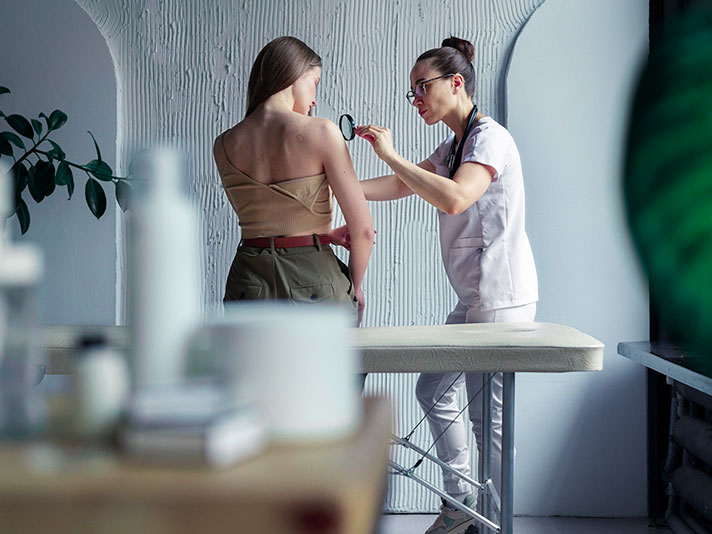
Skin disorders can be identified and treated by a dermatologist. Acne, rosacea, and plaque psoriasis are a few examples of them. A skin doctor can also recognize skin concerns that can point to underlying medical issues. For instance, dry, itchy skin occasionally signals renal (kidney) problems.
Numerous dermatologists perform minor surgery, including the removal of moles, warts, and performing skin biopsies. More extensive surgery will be a specialty of other dermatologists. These procedures could involve getting rid of skin cancer or benign cysts.
An expert in skin care, a dermatologist can handle skin problems that compromise your look. This can involve wrinkles, black patches, or hair loss. A lot of dermatologists have additional training in doing aesthetic procedures. These consist of laser hair removal, chemical peels, and fillers.
The Work of a Dermatologist
A dermatologist (skin doctor) can identify and handle a variety of skin problems. Sometimes skin rash may be related to an underlying illness, including problems with your stomach, kidneys, or thyroid, which can be discovered during your skin examination
Dermatologists also perform other procedures. They might carry out minor surgical treatments like skin biopsies or mole removal. Some focus on doing more extensive skin dermatology procedures, like cyst removal.
In addition, dermatologists are trained to offer cosmetic procedures, including Botox, fillers, chemical peels, and more.
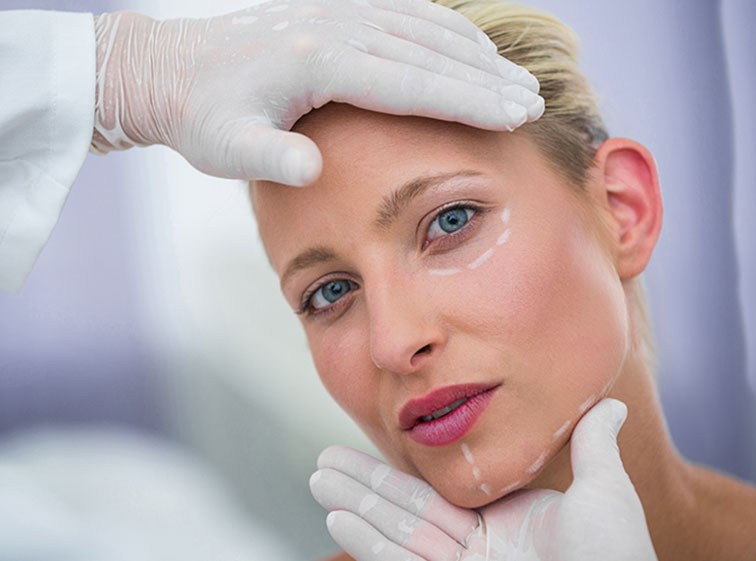
What Skin Conditions Can a Dermatologist (skin doctor) Treat?
More than 3,000 disorders that affect the skin, nails, and hair can be identified and treated by a skin expert physician. The following are some of the skin conditions that dermatologists frequently treat:
Medical Dermatology (for skin diseases)
- Acne
Acne affects people of all ages, genders, races, and skin tones. It is one of the most commonly reported skin diseases in the world. It can easily be treated with the help of medical dermatology.
- Actinic Keratosis
Years of exposure to the sun can cause actinic keratosis (AK), a dry, scaly spot on the skin. Although AK lesions can occur in a variety of ways, they are often scaly and range in color from skin-toned to reddish-brown.
- Age Spots
These are also referred to as liver spots, age spots, sun spots, or solar lentigines. Later in life, on sun-exposed parts of the skin, they start to develop as tiny, flat, spherical spots.
- Angiomas
The benign growths known as angiomas are formed from tiny blood arteries. On the body, they can appear everywhere, and the three most prevalent forms are spider angiomas, angiokeratomas, and cherry angiomas.
- Eczema
Dermatitis, another name for eczema, is a term to describe a variety of irritating, inflamed skin conditions. Typically, acute dermatitis appears as a red rash that may also be blistering or swollen.

Cosmetic Dermatology
- Laser and Light Therapies
Laser skin treatments allow skin dermatologists to regenerate and repair damaged skin without invasive methods. These procedures provide high-intensity light sources that are precisely focused with great energy on small parts of the skin and continue to be effective in treating wrinkles, scars, and skin imperfections.
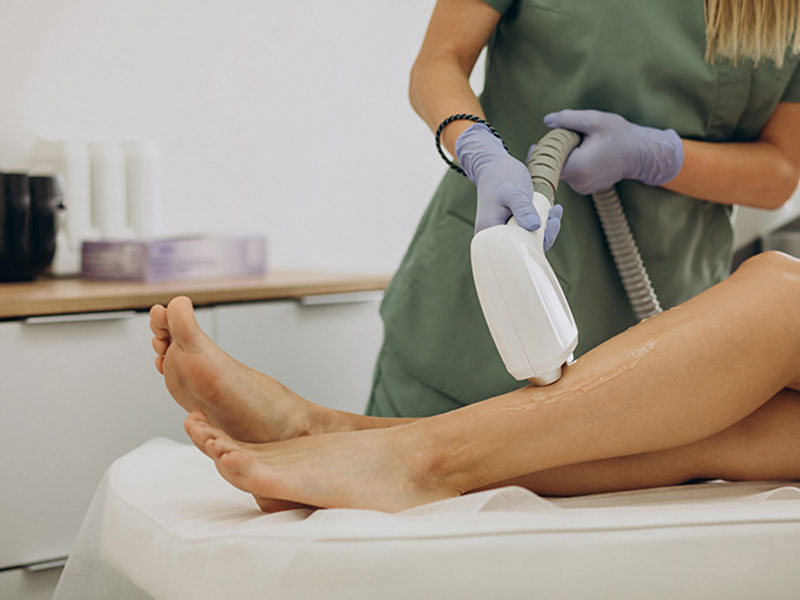
Skin dermatology can also correct and treat blood vessel and pigmentation issues with specific laser treatment modalities.
- Cosmetic Injections
Dermatologists (skin doctors) use cosmetic injections including fillers to make you look younger, reduce or eliminate apparent indications of stress, and rejuvenate your appearance. Cosmetic injections can frequently be used to prevent and lessen wrinkles.
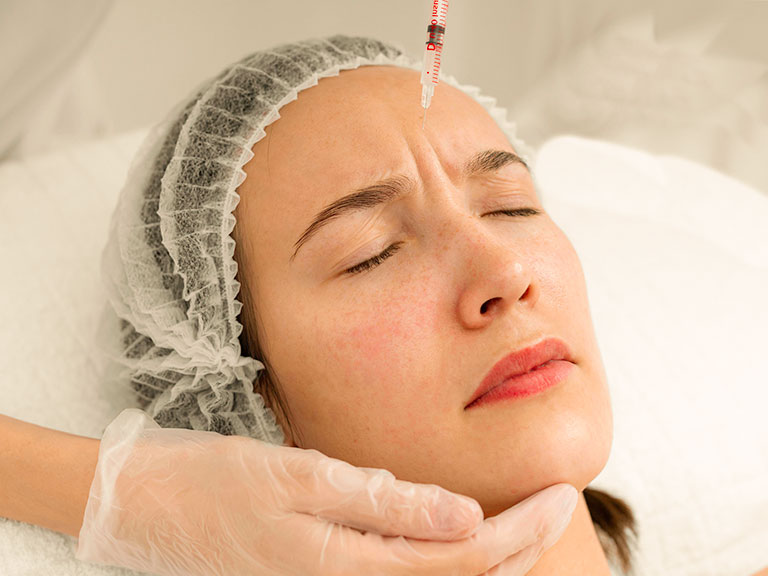
- Microneedling
Dermatologists and celebrities alike recommend the non-invasive skin procedure microneedling to cure skin laxity in people of all ages. Additionally, it treats acne scars and improves skin texture.
- Permanent makeup
The skin doctor will enhance your brows with microblading, conceal scars with skin camouflage, and use permanent cosmetics to enhance your lips and lash line. The most cutting-edge technology is used to give these innovative, market-leading beauty treatments.
Dermatopathology: Dermatology and Pathology
Dermatopathologists are medical professionals who examine skin, hair, and nail samples under a microscope to identify illnesses. Their area of expertise, dermatopathology, combines “dermatology,” which is the study of the skin, and “pathology,” which is the study of illness.
A pathologist operates in the field of every medical specialty, assisting in illness diagnosis and offering advice on patient care. This is a dermatopathologist in the discipline of dermatology.

What Are the Duties of a Dermatopathologist?
Dermatopathologist is a skin doctor who should examine tissue samples with light microscopes, electron microscopes, and fluorescence microscopes. These consist of items like tissue samples, scrapings from cells, and smears from skin lesions.
Dermatopathologists identify malignancies, immune system problems, infectious diseases, degenerative conditions, and more.
Occasionally, a dermatopathologist is required to provide you with the highest quality of skin dermatology procedures.
Should I See a Dermatologist or a Dermatopathologist?
A dermatopathologist won’t be there in person. If you have a skin problem like one of these, you’ll most likely visit a dermatologist instead:
- Hives or rashes
- A change in the way a mole looks
- Stubborn acne
- Hair loss
- Skin irritation
- Ingrown nails or fungus
- Scars from blemishes, cuts, or scrapes
Why Should You Visit a Dermatologist for your skin conditions?
There are several reasons for visiting a dermatologist. These consist of:
1. You developed a rash on your skin and can’t get rid of it
There are several reasons why a rash develops. You might be allergic to anything or have come into contact with poison ivy. Psoriasis, atopic dermatitis, and drug reactions are a few more rash-like conditions. Schedule a consultation if your rash is bothersome and not improving.
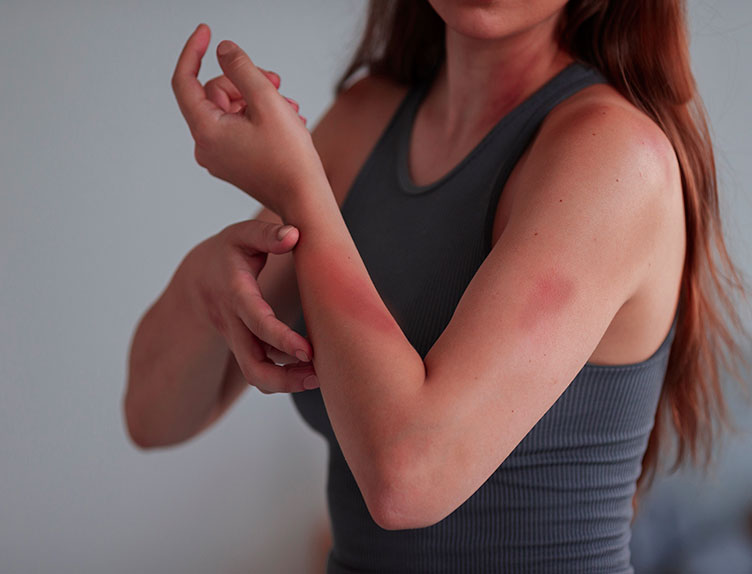
2. When treatments for your acne are not effective
Teenagers often struggle with acne, and many people find that over-the-counter medications keep acne under control. These therapies, however, don’t always work. Even in adults, stubborn acne can appear, and remedies that were successful in teens are no longer effective (or make the issue worse). A dermatologist can identify various forms of acne, provide treatments, and assist in reducing acne scars.
3. Warts
Although they are not hazardous, warts are reasonably prevalent, can be painful, and could impact your appearance. A skin doctor uses various techniques to get rid of them, including topical drugs, freezing them off (cryotherapy), and surgery.
4. Modifications to a Mole or Skin Patch
It’s time to contact a dermatologist if a mole or skin patch on your body has started to change form or enlarge. Obtaining a diagnosis as soon as possible is critical since these symptoms might point to skin cancer.
5. Cosmetic Procedures
Your confidence may be impacted by fine lines, wrinkles, sagging skin, and other concerns with your look. All dermatologists can suggest and carry out surgeries and treatments to address these issues.
Expectations from the Dermatologist
Seeing a dermatologist is the greatest thing you can do to make your face clean and shiny. But suppose you’ve never seen a skin doctor before. In that case, you may be curious about what happens during your first appointment and what to expect.
There are a few things you should consider before visiting a dermatologist:
- Make sure your skin is clean the day of your visit. If you arrive wearing makeup, you may be requested to remove it so the skin doctor can see your skin clearly.
- The skin doctor will examine your skin from head to toe. Remove any nail paint, and let long hair hang down.
- You might be requested to take off your clothing and wear a paper robe before entering the exam room.

During your initial skin dermatology appointment, you should also be prepared for:
1. Medical History
Much like a typical visit to your primary care physician, your first appointment with a dermatologist starts similarly. They’ll enquire about your medical background, prescriptions, and health issues.
Your dermatologist must know your medical history to treat your skin effectively. Even the concerns that aren’t explicitly linked to your skin are nevertheless significant.
You might wish to make a few preparations before your arrival. Put down:
- Any over-the-counter medications you use for acne.
- You’ve tried other items, too.
- Any existing medicines you may be taking.
Your dermatologist is likely to write you another prescription, so it’s critical that they be aware of all of your existing drugs to prevent any unexpected interactions.
2. Skin Exam
Don’t be shocked if you’re requested to take off your clothes and put on a cloth or paper gown. Suppose this is your first visit to a dermatologist. In that case, you might need to have your entire body checked for additional skin issues, as an illustration, suspicious moles.
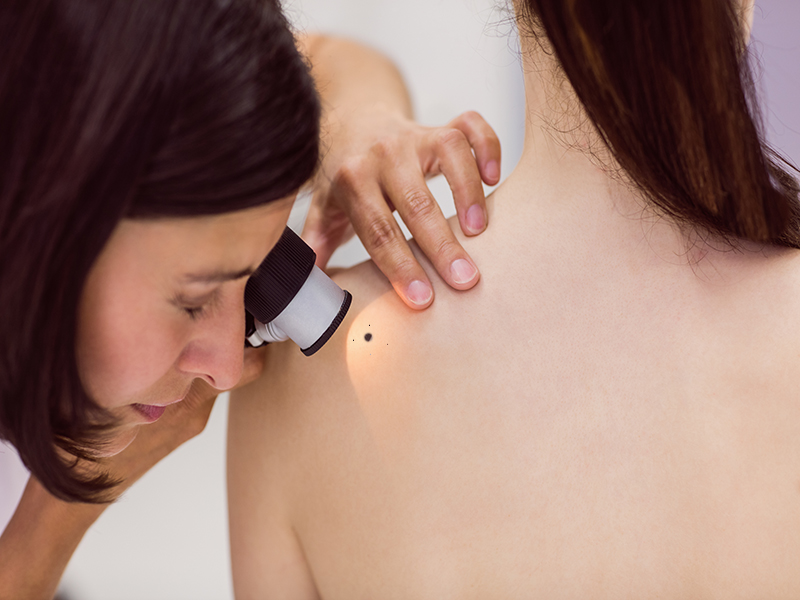
Remember that your skin doctor is there to assist you with all your skin problems, including ones you might not be aware of yet.
3. New Prescription Medication
Your dermatologist will likely provide you with a prescription for you after inspecting your skin and gathering all necessary data.
Typically, you may anticipate leaving that day with a prescription. Please make sure you know how to take your new medicine, as well as any potential side effects and how to deal with them.
Additionally, you should inquire how long it will take for things to improve and what you should do if things don’t go well.
4. Expect several visits
It would be fantastic if you could schedule a single appointment, obtain your medicine, and stop worrying about your problem forever. Unfortunately, this isn’t how visit to a dermatology clinic works.
Some patients may require several tries before finding the most appropriate treatment or combination therapies.
After seeing noticeable improvements, your dermatologist will still want to follow up with you regularly. They should ensure that your medicine is effective, that side effects aren’t too bothersome and check on the general condition of your skin.
Additionally, you’ll need to keep getting new or refill prescriptions for your chronic skin conditions like acne. These manage outbreaks rather than treating acne.
Take advantage of these additional visits which are crucial steps in attaining beautiful and healthy looking skin for the rest of your life.
Conclusion
Dermatologists are the best people to consult if you’re having skin related issues. There is no doubt that skin conditions can affect your confidence and cause you to feel pain. It may even make it difficult for you to perform your daily activities.
There is much more to dermatology than treating acne problems. In addition to treating obvious and routine skin problems, dermatologists also treat other kinds of issues.
In Canada, it can take a long time to see a dermatologist for skin conditions. The first thing you should do is to see your family doctor and ask for a referral to a dermatologist. You will then need to make an appointment with a dermatology clinic so that you can receive treatment. An appointment with a dermatologist, also known as a skin doctor, usually takes about 90-300 days if you live in a city with one.
However, in some cases you may need to be treated quickly, you can use the Remotederm online platform, which is secure, fast, and affordable. A board-certified dermatologist will be connected to you on our website within 12 to 48 hours, and there is no need to get a referral from your GP.
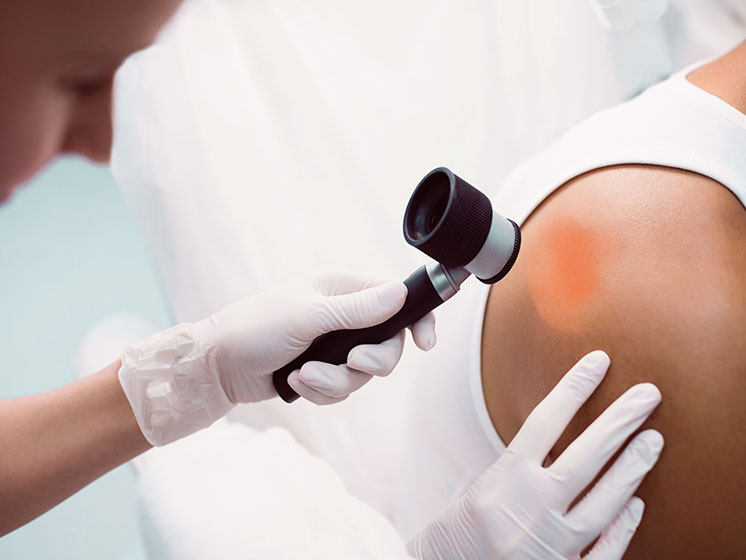
13 comments
Thanks for info
Are doctors able to treat herpes online too? If yes how?
Hi Liam!
Yes! RemoteDerm’s board certified dermatologists are experts in diagnosing all skin conditions. Please sign up and create a case with the details of your skin condition and photos. In less than 12 hours, they will diagnose the condition and prescribe medicine.
Thanks for the information.
i just wanted to know what can dermatologists do other than injections for skin rejuvenation?
Thank you for reading!
Dermatologists can help with skin rejuvenation in many ways, including Botox, Dermal fillers, Chemical Peels, Microneedling, etc. You can also receive a skin care routine tailored to your skin type and condition.
I want to ask, can family doctor do skin biopsy? is it safe?
Hi mina, Thank you for reaching out. Ideally, skin biopsies should be performed by a dermatologist, however, they are sometimes performed by primary care physicians or other nondermatology specialists when dermatologists are not available.
Are dermatologists able to prescribe skincare based on my skin type?
Hello Sheila, It is recommended that you consult a dermatologist in order to get the best skin care regimen suited to your skin type in order to prevent any potential skin problems and early aging of your skin. You can consult one of our dermatologists online.
Can a dermatologist help with scarring from past acne?
Yes, a dermatologist can definitely help with scarring from past acne. They offer various treatments, including topical medication, laser therapy, microdermabrasion, and chemical peels, to improve the appearance of scars.
I’ve heard that a dermatologist can remove warts, is that true?!
Yes, a dermatologist can remove warts and other skin growths. They also specialize in the diagnosis and treatment of various skin conditions, including acne, eczema, psoriasis, skin cancer, and more.
Visitor Rating: 5 Stars